Part One: "I'll have what he's having."

Now that the FDA has determined meat from cloned animals is safe to eat, all that remains to be decided is the matter of labeling: to label or not to label?
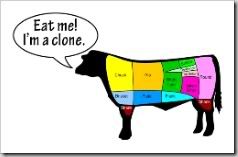 On the one hand, not labeling meat sourced from cloned animals could be seen as overly paternalistic, given that it confers the power to decide what's ok to eat to an agency of the federal government, a decidedly anti-conservative policy stance for a government run by a conservative party. Of course I mean "anti-conservative" in the old-fashioned sense, not in the nouveau, bloated-government, record-deficit sense.
On the one hand, not labeling meat sourced from cloned animals could be seen as overly paternalistic, given that it confers the power to decide what's ok to eat to an agency of the federal government, a decidedly anti-conservative policy stance for a government run by a conservative party. Of course I mean "anti-conservative" in the old-fashioned sense, not in the nouveau, bloated-government, record-deficit sense.
On the other hand, not labeling meat sourced from cloned animals could also be seen as pro-business, which clearly is a conservative policy stance, inasmuch as it secures the ability of producers to enhance their profitability by whatever cost-savings cloned meat can provide, without the looming threat of  superstition-fueled neo-commie farm-hippie protestors fire-bombing our Mickey D's. It calls to mind just how much nepotism has done to destroy the family farm, now a mere withering vestige of its Norman Rockwell heyday, perhaps even beyond the salving powers of a permanently dead death-tax.
superstition-fueled neo-commie farm-hippie protestors fire-bombing our Mickey D's. It calls to mind just how much nepotism has done to destroy the family farm, now a mere withering vestige of its Norman Rockwell heyday, perhaps even beyond the salving powers of a permanently dead death-tax.
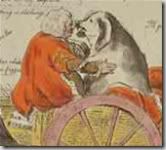
But how about that Smithfield company? Sounds like an honorable ancient Virginia lineage of proud ham craftsman to me. Why not just leave it at that? Who needs to look under the hood if the car runs fine? Feed-lot politics, with its wearying entourage of nattering nabobs harping on antibiotics, 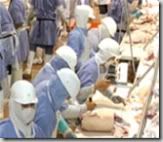 hormones, overflowing ponds of fecal waste and E. Coli in our organic spinach, only serve to obscure the honorable image of a
hormones, overflowing ponds of fecal waste and E. Coli in our organic spinach, only serve to obscure the honorable image of a  venerable American company spirally dissecting our holiday meal with love, care and a high-fructose corn syrup glaze.
venerable American company spirally dissecting our holiday meal with love, care and a high-fructose corn syrup glaze.
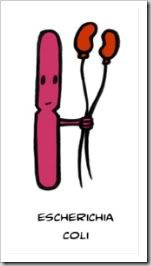
Now, as policy, protecting the public from information has succeeded admirably in the past. The deployment of recombinant BST in the milk-supply went almost unnoticed after the FDA forbade milk-producers from making specious claims that natural BST produced by cows was any better than the recombinant version, produced by bacteria. After all, genetically-engineered bacteria are friendly bacteria. They are the microbial world's version of the golden retriever, wanting nothing more than to fetch your slippers, or in this case bovine somatotrophic growth hormone.
 Sure, when rBST was introduced, there was some brouhaha about bovine mastitis and pus in the milk supply, but by now all that has faded away like a bad nightmare. Just try finding pus in your milk.
Sure, when rBST was introduced, there was some brouhaha about bovine mastitis and pus in the milk supply, but by now all that has faded away like a bad nightmare. Just try finding pus in your milk.
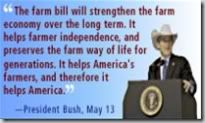 And harken back to the shining example of "country of origin" labeling for meats. Although the original law requiring such labeling was signed by President Bush in 2002, subsequent, better laws have since been signed, again and again in fact, busy beaver that he is, all serving to delay the implementation of labeling for the purpose of gathering further rounds of illuminating comments from AgriGeniuses. So don't sweat it until September 2008, at least. I'll bet the President gets a lot of comments saying "delay it some more." Think about it, why would you need to crowd more information on those tiny little labels, already over-burdened with so much nutritional gobbledygook, especially now that scientists have got the mad-cow problem all worked out.
And harken back to the shining example of "country of origin" labeling for meats. Although the original law requiring such labeling was signed by President Bush in 2002, subsequent, better laws have since been signed, again and again in fact, busy beaver that he is, all serving to delay the implementation of labeling for the purpose of gathering further rounds of illuminating comments from AgriGeniuses. So don't sweat it until September 2008, at least. I'll bet the President gets a lot of comments saying "delay it some more." Think about it, why would you need to crowd more information on those tiny little labels, already over-burdened with so much nutritional gobbledygook, especially now that scientists have got the mad-cow problem all worked out.
Hello Dolly!
So, to consumers already made jittery by information-overloaded labeling, and gripped by irrational fears of things already officially deemed safe, I say:
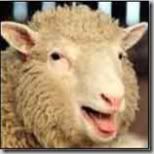 Let's make this a time to honor the hero's journey of Dolly the cloned sheep, and her infinite-series of sisters, as they doggedly make their way onward to the dinner plates of all free Americans. Not free, in the sense of being "free to choose what's best for oneself," but free in the more symbolic sense that our enemies love to hate so much.
Let's make this a time to honor the hero's journey of Dolly the cloned sheep, and her infinite-series of sisters, as they doggedly make their way onward to the dinner plates of all free Americans. Not free, in the sense of being "free to choose what's best for oneself," but free in the more symbolic sense that our enemies love to hate so much.
 It's a special day when any form of the word VAGINA appears in a mainstream headline, as in Vaginal Births Cause Tiny Brain Hemorrhages.
It's a special day when any form of the word VAGINA appears in a mainstream headline, as in Vaginal Births Cause Tiny Brain Hemorrhages.














